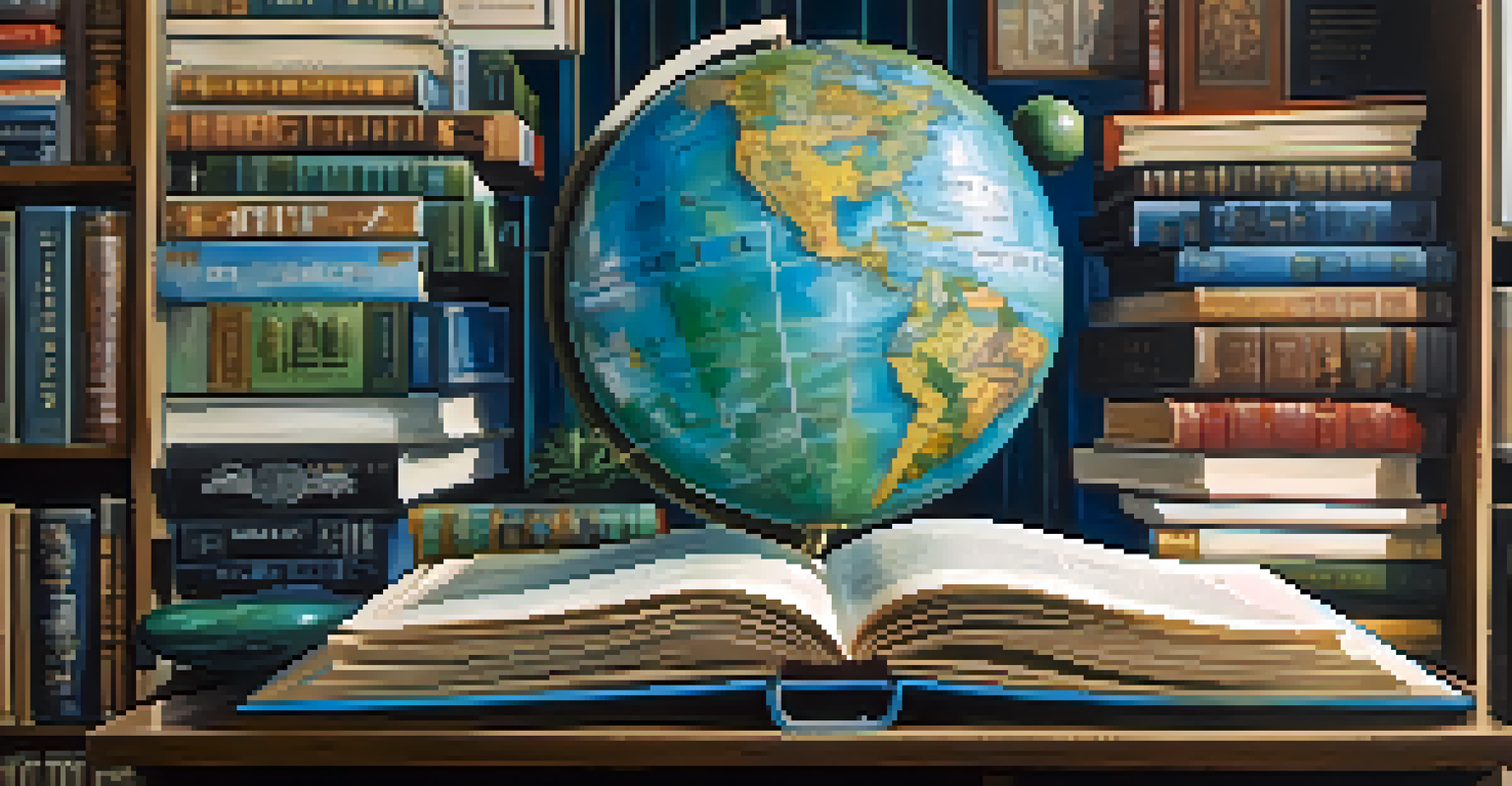The Globalization of Literature Through Hollywood Narratives

Hollywood's Role in Shaping Global Literature
Hollywood has become a powerful force in global storytelling, often adapting literary works from around the world. These adaptations not only bring diverse narratives to mainstream audiences but also highlight cultural themes that resonate universally. For example, the film adaptation of 'Life of Pi' brought a profound story from India to a global stage, showcasing the beauty and complexity of its narrative. Such adaptations allow audiences to experience different cultures and ideas, expanding their literary horizons.
Movies are a form of storytelling that can reach audiences worldwide, transcending language and cultural barriers.
Moreover, Hollywood's ability to transform literary works into films means that stories can reach audiences who might not typically engage with literature. This democratization of storytelling helps bridge cultural gaps, as viewers are introduced to new perspectives and ideas. Take 'The Kite Runner,' which not only tells a compelling story but also sheds light on Afghanistan's rich history and struggles, prompting discussions that might not have occurred otherwise.
In this way, Hollywood acts as a cultural ambassador, fostering a greater appreciation for global literature. While some purists may argue that adaptations sometimes stray from the original text, the essence of the stories often remains intact. By reimagining these narratives, Hollywood invites new generations to explore the original works, creating a cycle of interest in global literature.
Cultural Exchange: Literature and Film Intermingling
The globalization of literature through Hollywood narratives creates a dynamic cultural exchange. As filmmakers adapt stories from different regions, they often incorporate local customs, languages, and traditions, enriching the cinematic experience. This blending of cultures not only enhances the narrative but also educates viewers about the richness of diverse backgrounds. For instance, films like 'Slumdog Millionaire' showcase Indian culture while addressing universal themes of love and resilience.

Furthermore, this cultural exchange fosters collaboration between writers and filmmakers from various countries. When a book is adapted into a film, the original author often collaborates with the screenwriters and directors, ensuring that the heart of the story is preserved. This partnership often leads to a greater understanding of the cultural nuances embedded in the narrative, making the final product more authentic and relatable.
Hollywood Amplifies Global Narratives
Hollywood adapts diverse literary works, introducing unique cultural stories to mainstream audiences.
By showcasing such collaborations, Hollywood promotes a sense of global community within the literary and film industries. This interconnectedness encourages the sharing of ideas and storytelling techniques, leading to a richer tapestry of narratives. In essence, the globalization of literature through Hollywood not only entertains but also educates and connects people across the globe.
The Impact of Technology on Global Storytelling
The rise of technology has significantly influenced the globalization of literature and its adaptation into Hollywood films. Streaming platforms and social media have made it easier for international works to gain visibility, allowing audiences to discover stories from different cultures. For example, films like 'Parasite,' which gained massive acclaim, can now reach viewers who might not have had access to them in traditional theaters. This shift has revolutionized how stories are consumed and appreciated worldwide.
Literature is the most agreeable way of ignoring life.
Additionally, technology enables filmmakers to create high-quality adaptations that stay true to the original narratives. With advanced special effects and cinematography, filmmakers can visually represent complex themes and settings that may have been challenging to depict in earlier adaptations. This ability to bring stories to life in vivid detail enriches the viewer's experience and fosters a deeper understanding of the source material.
Moreover, technology facilitates global dialogue around these narratives. Audiences can engage with authors, filmmakers, and other fans through social media, creating a vibrant community of enthusiasts. This interaction not only promotes the original literature but also encourages a broader appreciation for the diverse stories that Hollywood continues to adapt.
Challenges of Cultural Representation in Adaptations
While Hollywood’s adaptations of global literature can enhance cultural awareness, they often face challenges regarding accurate representation. Misinterpretations or oversimplifications of cultural nuances can lead to criticism from both audiences and original authors. For instance, the adaptation of 'A Wrinkle in Time' faced backlash for its portrayal of certain characters and themes, highlighting the importance of sensitivity in storytelling.
Moreover, the challenge of representation extends beyond just cultural accuracy; it also encompasses diversity in storytelling teams. When adaptations are handled solely by individuals from a dominant culture, the risk of misrepresentation increases. Encouraging collaboration with local writers, directors, and cultural consultants can help mitigate these issues, ensuring that the essence of the original work is honored.
Cultural Exchange Enriches Storytelling
The collaboration between filmmakers and original authors fosters authentic representation and a deeper understanding of cultural nuances.
Addressing these challenges is crucial for Hollywood as it continues to adapt global literature. By prioritizing authentic representation and engaging with diverse voices, filmmakers can create adaptations that resonate more deeply with audiences and remain faithful to the original narratives. This commitment not only enriches the storytelling process but also fosters a broader understanding of the cultures being depicted.
The Role of Film Festivals in Promoting Global Literature
Film festivals play a pivotal role in showcasing adaptations of global literature, providing a platform for diverse narratives to shine. Events like the Cannes Film Festival or the Toronto International Film Festival often feature films adapted from international literature, introducing these stories to wider audiences. This exposure can spur interest in the original literary works, encouraging viewers to explore the books that inspired the films.
In addition to highlighting adaptations, film festivals also facilitate discussions around cultural representation and storytelling techniques. Panels and workshops allow filmmakers and authors to engage with audiences, sharing insights about the adaptation process and the importance of preserving cultural integrity. Such dialogues foster a deeper appreciation for the complexities of global storytelling and encourage collaboration among creatives from different backgrounds.
Ultimately, film festivals serve as a bridge between literature and cinema, celebrating the art of storytelling in all its forms. By promoting adaptations of global literature, these events not only entertain but also educate audiences about the richness of diverse cultures. This cultural celebration can inspire future filmmakers and writers to continue exploring and adapting stories from around the world.
Audience Reception: The Impact of Global Narratives
The reception of global narratives in Hollywood adaptations can vary widely among audiences, influenced by cultural backgrounds and personal experiences. Some viewers may find deep connections with the themes presented, while others might struggle to relate to narratives that are vastly different from their own. For example, films like 'Crouching Tiger, Hidden Dragon' captivated audiences with their unique storytelling, yet some critics argued that they did not fully capture the essence of the original Chinese literature.
However, successful adaptations often spark curiosity among viewers, prompting them to delve into the original literary works. After watching adaptations like 'The Alchemist,' many fans have sought out Paulo Coelho's novel to explore the deeper philosophical themes it presents. This phenomenon illustrates how film adaptations can serve as gateways to literature, encouraging audiences to broaden their reading lists and engage with diverse stories.
Technology Enhances Global Accessibility
Advancements in technology and streaming platforms allow international stories to reach broader audiences, transforming how narratives are consumed.
Ultimately, the audience's reception of global narratives underscores the power of storytelling in bridging cultural divides. By embracing diverse perspectives, Hollywood adaptations have the potential to foster empathy and understanding among viewers. This connection not only enriches the cinematic experience but also highlights the importance of embracing global literature in a rapidly changing world.
Looking Ahead: The Future of Global Literature in Hollywood
As Hollywood continues to evolve, the future of global literature in film looks promising. With an increasing appetite for diverse stories, filmmakers are more willing to explore narratives from various cultures. This shift reflects a growing recognition of the importance of authentic representation and the value of diverse storytelling in the industry. Films like 'Minari' and 'Nomadland' have paved the way for more inclusive narratives, showcasing the beauty of individual stories within the broader tapestry of human experience.
Moreover, the ongoing rise of streaming platforms is breaking down barriers to entry for international films. This accessibility allows audiences to discover and appreciate stories that might have previously gone unnoticed. As platforms like Netflix continue to invest in global content, we can expect to see an even broader range of adaptations that celebrate literature from around the world.

In conclusion, the globalization of literature through Hollywood narratives is a journey that continues to unfold. As industries collaborate and audiences demand more diverse stories, the landscape of storytelling will only grow richer. By celebrating global literature, Hollywood not only entertains but also contributes to a more interconnected world, where stories transcend borders and cultures.